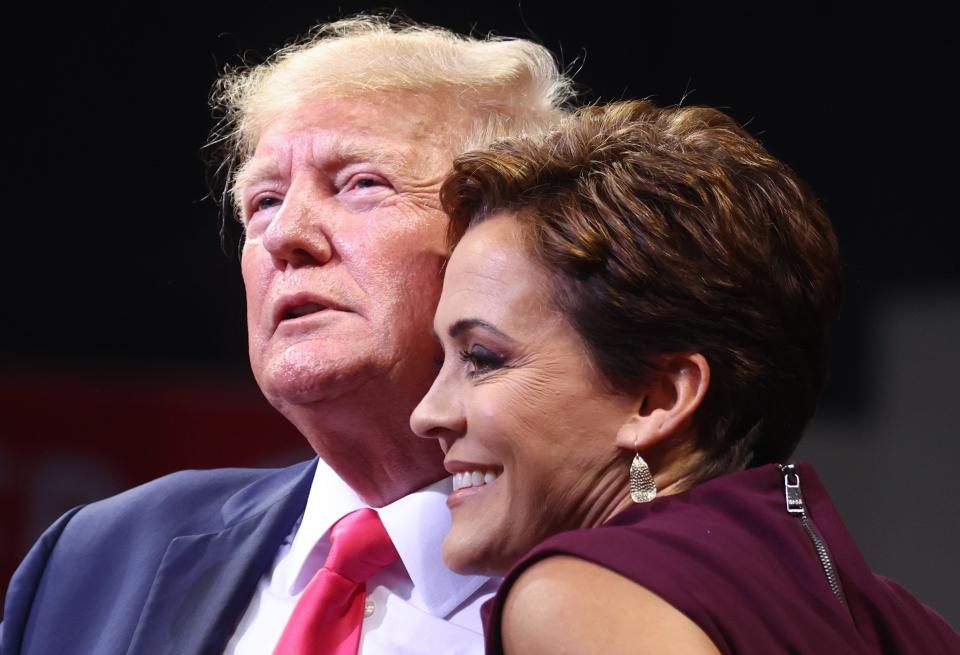Primary fallout: Democrats have momentum; Donald Trump Republicans face obstacles
- Oops!Something went wrong.Please try again later.
- Oops!Something went wrong.Please try again later.
- Oops!Something went wrong.Please try again later.
WASHINGTON – Primary season is over, and six months of intraparty political battles revealed one basic thing: The Democrats are in better shape for the November elections than previously thought.
The Republicans remain favored to regain control of the U.S. House, according to polls and political analysts, but Democrats are now in position to win a good number of big-state governors' races and expand their slim-as-possible advantage in the U.S. Senate.
There are at least two reasons why, political analysts said: Rookie Republican candidates who are backed by the ever-contentious Donald Trump, and the emergence of abortion rights as a major campaign issue revving up Democratic voters.
It has been a "poor national environment for Democrats, but candidate quality matters," said Gunner Ramer, political director with the Republican Accountability Project, an anti-Trump political organization. In addition, the Supreme Court decision against abortion rights "changed the dynamic of the mid-terms" and made it a "choice election."
"The Democratic prospects look a lot better than expected," Ramer said.
The Senate scene:Control of the Senate is now a coin flip: These are the 7 midterm election races to watch
In the House:Will Republicans flip the House in midterm elections? These 12 races will tell the story.
Jessica Taylor, the Senate and Governors Editor of the nonpartisan Cook Political Report, said Trump's injection of himself into the campaign makes it less of a referendum on Democratic President Joe Biden, probably to the detriment of Republican candidates.
"It really does feel like Republicans are trying snatch defeat from the jaws of victory," she said.
Republicans remain confident, banking on the history that says the party out of power tends to do well in midterm elections.
After a set of primaries dominated by the specter of Trump, Republicans noted that voters remain worried about inflation and the economy in general, and that President Joe Biden's approval rating is in the low 40s.
"I'm very optimistic about this fall," said Sen. Rick Scott, R-Fla., who chairs the Republican Senatorial Campaign Committee, speaking to radio talk show host Hugh Hewitt. "Great candidates; Biden's numbers are horrible."
The Trump Republicans
Tuesday's contest in New Hampshire, Rhode Island, and Delaware ended a primary season that began in Texas on March 1.
For Republicans, the primaries saw an unprecedented level of involvement by an ex-president, one who had lost his own re-election bid just two years before.
One result: Trump-backed candidates won Republican nominations for the U.S. Senate in state races that will decide which party will control the chamber next year.
Senate candidates making their first political race – Herschel Walker in Georgia, Mehmet Oz in Pennsylvania, J.D. Vance in Ohio, and Blake Masters in Arizona – have made their share of rookie mistakes and face tough contests against well-known Democrats.
The Democratic Senate candidates include incumbent officer holders who breezed to primary victories: Sen. Raphael Warnock in Georgia, Sen. Mark Kelly in Arizona, U.S. Rep. Tim Ryan in Ohio, and Lt. Gov. John Fetterman in Pennsylvania.

New Hampshire
The last night of primaries on Tuesday produced more evidence of Trump's impact on the Senate races, thanks to a primary in New Hampshire.
Don Bolduc, a retired Army general who believes Trump's false claims about the 2020 election, won the Republican nomination for the U.S. Senate, defeating a more establishment GOP candidate, Chuck Morse, who had the firm backing of popular GOP Gov. Chris Sununu.
Morse conceded the close race early Wednesday.

Many Republicans said Bolduc, who has a history of far-right statements, will have a more difficult time defeating incumbent Sen. Maggie Hassan, D-N.H., making it that much harder for the GOP to reclaim control of the Senate.
Hassan and the Democrats have already made an issue of Bolduc's views. Amanda Sherman-Baity, a spokesperson for the, Democratic Senatorial Campaign Committee, said that “Republicans tried everything they could to stop Bolduc in this primary because even they know his dangerous conspiracy theories are totally out-of-step with the voters."
Scott, the head of the Republican committee, hailed Bolduc's win by saying that he "earned the right to take on one of the most vulnerable members of the U.S. Senate, Maggie Hassan."
Trump himself saluted Bolduc and other supporters, saying in a Truth Social post: "Nice! The 'Trumpiest' people ALL won in New Hampshire last night. MAKE AMERICA GREAT AGAIN!!!"
Any of these close state contests could decide the majority. The Senate is currently divided 50-50 between the two parties. Democrats have control because of the tie-breaking vote of Vice President Kamala Harris.
As the primaries wrapped up early Wednesday, the FiveThirtyEight website, which analyzes polling data, gives Democrats a 71 out of 100 chance to keep control of the Senate.
Trump under scrutiny
Less than two months before Election Day, Trump-style candidates also face tough sledding in a string of governors' races.
They include Doug Mastriano in Pennsylvania, Kari Lake in Arizona, Tudor Dixon in Michigan, and Tim Michels in Wisconsin.
Races for statehouses:Abortion, voting and COVID-19: Why we're eyeing these 10 governor's races in 2022 midterms
Election denial:Voter 'subversion': Trump Republicans push laws to make it easier to change elections, per report
Trump candidates also did well in many House primaries, and many are favored to win general elections in safe Republican districts.

The ex-president also used the primaries to try to knock off Republicans who had opposed him, and he was successful – to a degree.
Trump-backed candidates knocked off four House Republicans who voted to impeach him over the attempted insurrection of Jan. 6, 2021, an attack that followed Trump's efforts to overturn his election loss to Biden. That group included Rep. Liz Cheney, R-Wyo., once a rising star in the party, who lost her position in House GOP leadership because of her relentless criticism of Trump.
A few Trump targets prevailed in primaries anyway, including incumbent Georgia Gov. Brian Kemp.
Trump candidates and voters
In polls and focus groups, voters describe some of these Trump-like candidates as too extreme on too many issues, including the former president's false claims of widespread voter fraud in his 2020 election loss to Biden.
Republican "election deniers" won primaries up and down the ballot this year, including races for state offices that have control of future elections.
Political analysts said Republican chances with independent voters are not helped by the fact that Trump is under criminal investigation on at least three fronts.
Grand juries in Washington, D.C., and Atlanta are looking into Trump's hoarding of classified documents after leaving office, efforts to overturn his election loss to Biden, and actions related to the Jan. 6 insurrection.
The Washington investigation:Justice Department subpoenas dozens of Trump aides in apparent escalation of investigation, according to reports
The Atlanta probe:Giuliani appeared for 6 hours before Georgia grand jury; Trump attorney is target in inquiry: recap
"It's certainly not as good an environment as Republicans had hoped to have a couple of months ago," said Jack Pitney, professor of government at Claremont McKenna College in California.
Another primary issue: Abortion
The primary season also spawned a major issue provided by the Supreme Court: abortion.
On June 24, a majority of the court struck down Roe v. Wade, the 1973 ruling that had made abortion a constitutional right.
Giving states the right to severely restrict or outright ban abortions, the ruling energized Democratic voters, particularly young women, in legislative and congressional races across the country.
The salience of the abortion issue came into stark relief during an August referendum in Kansas. Although it is a Republican-leaning state, voters in Kansas soundly rejected a proposal that would have allowed the legislature to restrict or even ban abortions.
Abortion opponents who have long sought to end Roe v. Wade said their voters are fired up at the prospect of legislation ending the practice.
The choice campaign:Channeling abortion outrage, Democratic women push for upsets in Senate elections
Abortion ban:Lindsey Graham's attempt at a national abortion ban could help GOP in midterms. What we know about the bill
As the primaries wrapped up Tuesday, Sen. Lindsey Graham, R-S.C., proposed a federal ban on abortions after 15 weeks of pregnancy, saying it is designed to counter Democratic plans to "basically allow abortion up to the moment of birth."
Gary Peters, chairman of the Democratic Senatorial Campaign Committee, said the "Republicans' national abortion ban will be on the ballot, in every Senate race."
Republican hopes
While Democrats had a good primary year, many Republicans remain confident about the November elections.
Turnout machines are cranking up and Republican candidates are starting to advertise more, they said. Voters remain worried about inflation and the economy, and frustrated with Biden.
“The fundamentals of the election are still firmly leaning Republican,” said Calvin Moore, communications director for the Congressional Leadership Fund, a political action committee that raises money for GOP candidates.
As of Wednesday morning, the FiveThirtyEight website said Republicans still have a 73 in 100 chance to regain the House majority, though with a smaller margin than once thought.
The Senate and many governors' races are a different story, thanks to a series of primaries that Taylor said gave Democrats "a huge life raft."
Pitney said Democrats have had a better-than-expected primary season for a unique reason: "They didn't have Trump messing everything up."
This article originally appeared on USA TODAY: Primary fallout: Democrats energize; Trump Republicans struggle

